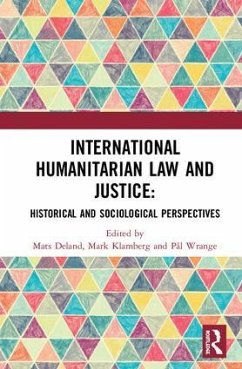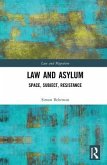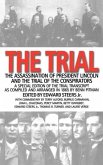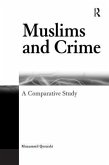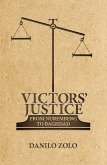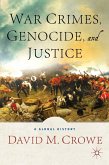International Humanitarian Law and Justice
Historical and Sociological Perspectives
Herausgeber: Deland, Mats; Wrange, Pål; Klamberg, Mark
International Humanitarian Law and Justice
Historical and Sociological Perspectives
Herausgeber: Deland, Mats; Wrange, Pål; Klamberg, Mark
- Gebundenes Buch
- Merkliste
- Auf die Merkliste
- Bewerten Bewerten
- Teilen
- Produkt teilen
- Produkterinnerung
- Produkterinnerung
This book brings together scholars from various fields, including law, history, sociology and international relations to examine this historization of international humanitarian law.
Andere Kunden interessierten sich auch für
![Law and Asylum Law and Asylum]() Simon BehrmanLaw and Asylum197,99 €
Simon BehrmanLaw and Asylum197,99 €![Law and Sexual Misconduct in New England, 1650-1750 Law and Sexual Misconduct in New England, 1650-1750]() Abby ChandlerLaw and Sexual Misconduct in New England, 1650-1750190,99 €
Abby ChandlerLaw and Sexual Misconduct in New England, 1650-1750190,99 €![The Trial The Trial]() The Trial58,99 €
The Trial58,99 €![Muslims and Crime Muslims and Crime]() Muzammil QuraishiMuslims and Crime218,99 €
Muzammil QuraishiMuslims and Crime218,99 €![Victors' Justice: From Nuremberg to Baghdad Victors' Justice: From Nuremberg to Baghdad]() Danilo ZoloVictors' Justice: From Nuremberg to Baghdad23,99 €
Danilo ZoloVictors' Justice: From Nuremberg to Baghdad23,99 €![War Crimes, Genocide, and Justice War Crimes, Genocide, and Justice]() D. CroweWar Crimes, Genocide, and Justice64,99 €
D. CroweWar Crimes, Genocide, and Justice64,99 €![The Working Papers of Hugo Grotius The Working Papers of Hugo Grotius]() Martine Julia van IttersumThe Working Papers of Hugo Grotius302,99 €
Martine Julia van IttersumThe Working Papers of Hugo Grotius302,99 €-
-
-
This book brings together scholars from various fields, including law, history, sociology and international relations to examine this historization of international humanitarian law.
Hinweis: Dieser Artikel kann nur an eine deutsche Lieferadresse ausgeliefert werden.
Hinweis: Dieser Artikel kann nur an eine deutsche Lieferadresse ausgeliefert werden.
Produktdetails
- Produktdetails
- Verlag: Taylor & Francis Ltd (Sales)
- Seitenzahl: 232
- Erscheinungstermin: 18. Oktober 2018
- Englisch
- Abmessung: 234mm x 156mm x 14mm
- Gewicht: 517g
- ISBN-13: 9781138477551
- ISBN-10: 1138477559
- Artikelnr.: 54441109
- Herstellerkennzeichnung
- Libri GmbH
- Europaallee 1
- 36244 Bad Hersfeld
- gpsr@libri.de
- Verlag: Taylor & Francis Ltd (Sales)
- Seitenzahl: 232
- Erscheinungstermin: 18. Oktober 2018
- Englisch
- Abmessung: 234mm x 156mm x 14mm
- Gewicht: 517g
- ISBN-13: 9781138477551
- ISBN-10: 1138477559
- Artikelnr.: 54441109
- Herstellerkennzeichnung
- Libri GmbH
- Europaallee 1
- 36244 Bad Hersfeld
- gpsr@libri.de
Mats Deland is Associate Professor in history and temporary lecturer at Mittuniversitet, Sundsvall, Sweden. His publications include Purgatorium (vol. 1, 2010, vol. 2, 2017) and he has expertise in Holocaust studies and Genocide studies, Urban history, Right-Wing Extremism, and the History of International Law. Dr. Mark Klamberg (Jur. Dr. Stockholm University, LL.M. Raoul Wallenberg Institute and Jur. Kand. Lund University) is Associate Professor in international law at Stockholm University. He is the author of several publications on international criminal law, surveillance, privacy, and other fields of international law, including "Evidence in International Criminal Trials: Confronting Legal Gaps and the Reconstruction of Disputed Events" (Martinus Nijhoff Publishers, 2013) and "Power and Law in the International Society - International Relations as the Sociology of International Law" (Routledge, 2015). He is the chief editor of the " Commentary on the Law of the ICC" (CLICC). Pål Wrange (PhD, LL.M) is Professor in public international law at Stockholm University and the Director of the Stockholm Center for International Law and Justice. He is a former principal legal advisor at the Swedish Ministry for Foreign Affairs. He has published widely on international law, international relations and theory and he has worked and consulted for the European Union, governments, and NGOs. He is currently working on a book on non-state actors, right authority, and the right to use military violence.
1: Introduction; 2: PART ONE; 3: Chapter 1 - Introduction; 4: Chapter 2 -
Historicising International Criminal Trials within the Modernist Project;
5: Chapter 3 - Engaging History in the Legal Protection of Cultural
Heritage in War and Peace; 6: Chapter 4 - From Spies to International
Criminals: The Influence of the Austro-Hungarian Counter Espionage Service
on the International Criminal Police Commission; 7: Chapter 5 - Authority,
Legitimacy and Military Violence: De Facto Combatant Privilege of Non-State
Armed Groups through Amnesty; 8: PART TWO; 9: Chapter 1 - Introduction:
Evolution of Rules and Concepts in International Humanitarian Law:
Navigating through Legal Gaps and Fault-lines; 10: Chapter 2 - A hidden
fault-line: How international actors engage with IHL's principle of
distinction; 11: Chapter 3 - Restraint in bello: Some thoughts on
reciprocity and humanity; 12: Chapter 4 - Judging the past - international
humanitarian law and the Luftwaffe aerial operations during the invasion of
Poland in 1939; 13: PART THREE; 14: Chapter 1 - Introduction: Emotions and
the law; 15: Chapter 2 - To feel or not to feel? Emotions and international
humanitarian law To feel or not to feel? Emotions and international
humanitarian law; 16: Chapter 3 - To Kill or Not to Kill as a Social
Question; 17: Chapter 4 - War of Wor(l)ds - Clashing Narratives and
Interpretations of I(H)L in the Intractable Israeli-Palestinian Conflict;
18: PART FOUR; 19: Introduction: The lawyer as an actor in history and
society; 20: Chapter 2 - Lemkin on vandalism and the protection of cultural
works and historical monuments during armed conflict; 21: Chapter 3 -
Forgotten, but nevertheless relevant! Gustave Moynier's attempts to punish
violations of the laws of war 1870-1916; 22: Chapter 4 - The feminist
origins of the Swedish Red Cross; 23: Index
Historicising International Criminal Trials within the Modernist Project;
5: Chapter 3 - Engaging History in the Legal Protection of Cultural
Heritage in War and Peace; 6: Chapter 4 - From Spies to International
Criminals: The Influence of the Austro-Hungarian Counter Espionage Service
on the International Criminal Police Commission; 7: Chapter 5 - Authority,
Legitimacy and Military Violence: De Facto Combatant Privilege of Non-State
Armed Groups through Amnesty; 8: PART TWO; 9: Chapter 1 - Introduction:
Evolution of Rules and Concepts in International Humanitarian Law:
Navigating through Legal Gaps and Fault-lines; 10: Chapter 2 - A hidden
fault-line: How international actors engage with IHL's principle of
distinction; 11: Chapter 3 - Restraint in bello: Some thoughts on
reciprocity and humanity; 12: Chapter 4 - Judging the past - international
humanitarian law and the Luftwaffe aerial operations during the invasion of
Poland in 1939; 13: PART THREE; 14: Chapter 1 - Introduction: Emotions and
the law; 15: Chapter 2 - To feel or not to feel? Emotions and international
humanitarian law To feel or not to feel? Emotions and international
humanitarian law; 16: Chapter 3 - To Kill or Not to Kill as a Social
Question; 17: Chapter 4 - War of Wor(l)ds - Clashing Narratives and
Interpretations of I(H)L in the Intractable Israeli-Palestinian Conflict;
18: PART FOUR; 19: Introduction: The lawyer as an actor in history and
society; 20: Chapter 2 - Lemkin on vandalism and the protection of cultural
works and historical monuments during armed conflict; 21: Chapter 3 -
Forgotten, but nevertheless relevant! Gustave Moynier's attempts to punish
violations of the laws of war 1870-1916; 22: Chapter 4 - The feminist
origins of the Swedish Red Cross; 23: Index
1: Introduction; 2: PART ONE; 3: Chapter 1 - Introduction; 4: Chapter 2 -
Historicising International Criminal Trials within the Modernist Project;
5: Chapter 3 - Engaging History in the Legal Protection of Cultural
Heritage in War and Peace; 6: Chapter 4 - From Spies to International
Criminals: The Influence of the Austro-Hungarian Counter Espionage Service
on the International Criminal Police Commission; 7: Chapter 5 - Authority,
Legitimacy and Military Violence: De Facto Combatant Privilege of Non-State
Armed Groups through Amnesty; 8: PART TWO; 9: Chapter 1 - Introduction:
Evolution of Rules and Concepts in International Humanitarian Law:
Navigating through Legal Gaps and Fault-lines; 10: Chapter 2 - A hidden
fault-line: How international actors engage with IHL's principle of
distinction; 11: Chapter 3 - Restraint in bello: Some thoughts on
reciprocity and humanity; 12: Chapter 4 - Judging the past - international
humanitarian law and the Luftwaffe aerial operations during the invasion of
Poland in 1939; 13: PART THREE; 14: Chapter 1 - Introduction: Emotions and
the law; 15: Chapter 2 - To feel or not to feel? Emotions and international
humanitarian law To feel or not to feel? Emotions and international
humanitarian law; 16: Chapter 3 - To Kill or Not to Kill as a Social
Question; 17: Chapter 4 - War of Wor(l)ds - Clashing Narratives and
Interpretations of I(H)L in the Intractable Israeli-Palestinian Conflict;
18: PART FOUR; 19: Introduction: The lawyer as an actor in history and
society; 20: Chapter 2 - Lemkin on vandalism and the protection of cultural
works and historical monuments during armed conflict; 21: Chapter 3 -
Forgotten, but nevertheless relevant! Gustave Moynier's attempts to punish
violations of the laws of war 1870-1916; 22: Chapter 4 - The feminist
origins of the Swedish Red Cross; 23: Index
Historicising International Criminal Trials within the Modernist Project;
5: Chapter 3 - Engaging History in the Legal Protection of Cultural
Heritage in War and Peace; 6: Chapter 4 - From Spies to International
Criminals: The Influence of the Austro-Hungarian Counter Espionage Service
on the International Criminal Police Commission; 7: Chapter 5 - Authority,
Legitimacy and Military Violence: De Facto Combatant Privilege of Non-State
Armed Groups through Amnesty; 8: PART TWO; 9: Chapter 1 - Introduction:
Evolution of Rules and Concepts in International Humanitarian Law:
Navigating through Legal Gaps and Fault-lines; 10: Chapter 2 - A hidden
fault-line: How international actors engage with IHL's principle of
distinction; 11: Chapter 3 - Restraint in bello: Some thoughts on
reciprocity and humanity; 12: Chapter 4 - Judging the past - international
humanitarian law and the Luftwaffe aerial operations during the invasion of
Poland in 1939; 13: PART THREE; 14: Chapter 1 - Introduction: Emotions and
the law; 15: Chapter 2 - To feel or not to feel? Emotions and international
humanitarian law To feel or not to feel? Emotions and international
humanitarian law; 16: Chapter 3 - To Kill or Not to Kill as a Social
Question; 17: Chapter 4 - War of Wor(l)ds - Clashing Narratives and
Interpretations of I(H)L in the Intractable Israeli-Palestinian Conflict;
18: PART FOUR; 19: Introduction: The lawyer as an actor in history and
society; 20: Chapter 2 - Lemkin on vandalism and the protection of cultural
works and historical monuments during armed conflict; 21: Chapter 3 -
Forgotten, but nevertheless relevant! Gustave Moynier's attempts to punish
violations of the laws of war 1870-1916; 22: Chapter 4 - The feminist
origins of the Swedish Red Cross; 23: Index

